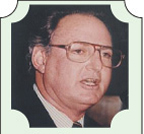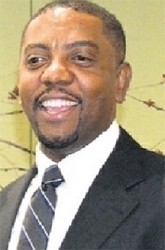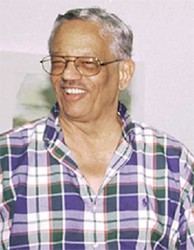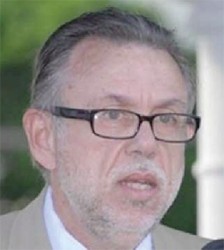By Tony Co0zier
INFLUENTIAL pressure continues to mount on West Indies Cricket Board (WICB) president Dave Cameron and his directors for their handling of the team’s abandonment of the tour of India in October and the subsequent fallout.
Pat Rousseau, WICB president 1996-2001 and now a member of the Constitutional Committee, and Kittian Queen’s Counsel Charles Wilkin, who resigned from the governance committee after his commissioned report on the structure of the WICB was rejected by its directors last year, have both issued statements on the issue.

Rosseau asks searching questions of Cameron over the WICB’s lax adherence to its constitution and its disregard of its disciplinary committee.
He also wants Cameron to state whether he is paid, and how much, as executive president, a position for which, he points out, there is no provision under the constitution.
Wilkin, a former Cambridge University and Leeward Islands left-arm spinner whose late father, Calvin, was long-standing president of the Leewards cricket association and member of the WICB, calls on CARICOM governments to “use their leverage to force the board to become relevant” and for the people of the Caribbean to call for such intervention.
“If not, the time is not long when the other cricket countries will relieve West Indies cricket from its misery and force it into permanent second class status,” Wilkin adds. “That would certainly kill cricket as a regional institution.”
The two follow last week’s strongly-worded letter to Cameron from prime minister Ralph Gonsalves of St. Vincent and the Grenadines, effectively accusing the WICB president of betraying an agreement between himself on behalf of his board, the West Indies Players Association (WIPA) and the 14 players involved in India over the dropping of ODI captain, Dwayne Bravo, Keiron Pollard and, initially, Darren Sammy, from the team for the upcoming ODIs in South Africa.


The accord, brokered by Gonsalves at a meeting at the Hyatt Hotel in Port-of-Spain, stated there would be no discrimination or victimization in selection for the Test and ODI series in South Africa. He called the WICB’s backtrack “village vengeance”.
Wilkin notes that 2015 is 20 years since the West Indies were beaten 2-1 at home by Australia, ending their record of 15 years without losing a series since when it has had six presidents and seven CEOs and been in “constant disputes with its players and suffered three player strike”.
“Now it is facing the mother of all law suits, that for US$41.9 million from India for the financial loss suffered by WICB’s abandonment of the recent tour,” he added. “That claim, which WICB has not challenged, makes it effectively bankrupt and exposes its directors to personal liability for its debts. But not even that will wake them up to the need for change.”
He added: “True to form, the president remains firmly in place despite his arrogance and ineptitude in dealing with the latest crisis and despite his having insulted the Board of Control for Cricket in India (BCCI) and helping to bring on the law suit.”

Rousseau queries whether Cameron gave “any instructions or had any conversation” with chairman Clive Lloyd or members of the selection committee or whether there were discussions arranged through CEO Michael Muirhead prior to the omission of Bravo for the South Africa ODIs.
He asks whether any perceived disciplinary breaches by the players in India were referred to the Disciplinary Committee, adding that any player’s exclusion from the South Africa ODIs “without a hearing is discrimination against the player”.
Rousseau claims there was a renewal of the Digicel contract with the WICB since Cameron became president and pointedly asks: “Does it contain the same provision requiring the sponsor to pay the sponsorship fee to the Digicel agent giving him authority to deduct money from that payment before paying the Board?”.





